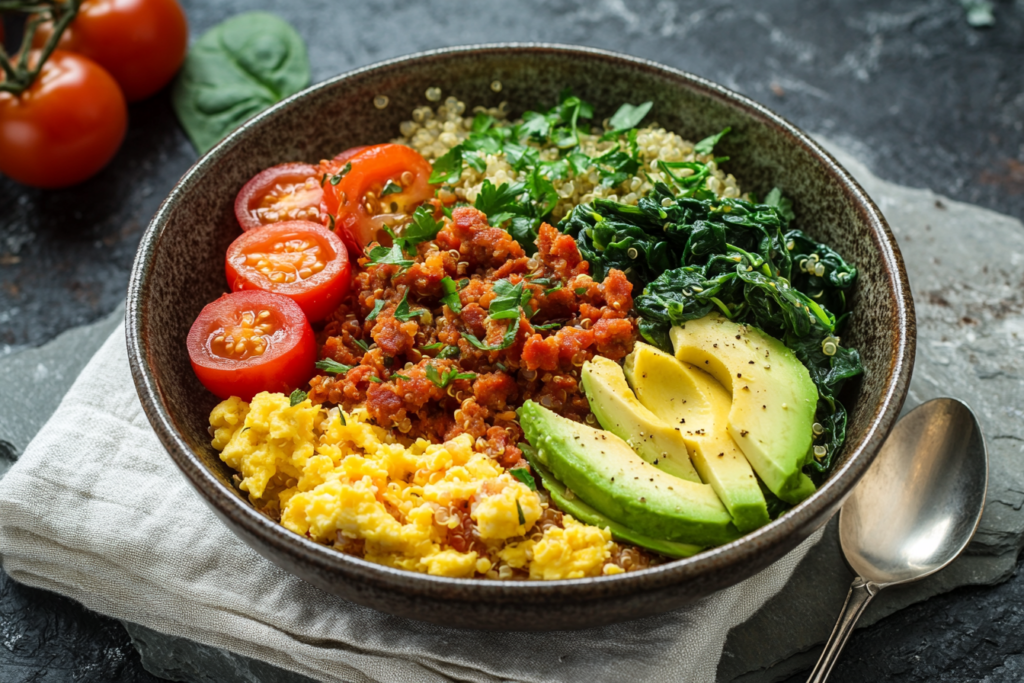Introduction
Chorizo with eggs is a beloved dish with roots in Spanish and Mexican cuisines. Its bold flavors and satisfying texture make it a staple for breakfasts and brunches worldwide. While it’s undoubtedly delicious, many wonder, is chorizo with eggs healthy? The answer depends on various factors, including the nutritional content of the ingredients, portion control, and preparation methods.
This guide explores the health aspects of chorizo with eggs in detail, focusing not only on its nutritional value but also on potential concerns and practical tips for making it a healthier option. Furthermore, it provides valuable insights into balancing flavor with nutrition. Whether you’re already a fan of this dish or are simply evaluating its dietary impact, this comprehensive overview will help you make a well-informed decision. Ultimately, it will allow you to enjoy this classic meal in a smarter and more mindful way.
Nutritional Profile of Chorizo and Eggs
What Is Chorizo? Types and Variations
Chorizo is a type of sausage originating from Spain, now popular in many cuisines worldwide. The two main varieties are:
- Spanish Chorizo:
- A cured or semi-cured sausage, often sliced and eaten as a snack or incorporated into stews, soups, and casseroles.
- Its smoky flavor comes from the paprika used in its preparation.
- Mexican Chorizo:
- A fresh sausage made from ground pork or beef mixed with seasonings. It must be cooked before consumption.
- Known for its vibrant red color and spicier taste, it’s commonly used in tacos, burritos, and breakfast dishes like chorizo and eggs.
Nutritional Content of Chorizo
While flavorful, chorizo is calorie-dense and rich in fat and sodium. On average, a 2-ounce serving of cooked chorizo contains:
- Calories: 220–250
- Protein: 12–14 grams
- Fat: 18–20 grams (including 6–8 grams of saturated fat)
- Sodium: 500–700 mg
Nutritional Benefits of Eggs
Eggs are considered a nutritional powerhouse, boasting essential vitamins and minerals. One large egg provides:
- Calories: 70–75
- Protein: 6 grams
- Healthy Fats: 5 grams (including 1.5 grams of saturated fat)
- Cholesterol: 186 mg (but research suggests dietary cholesterol has a limited effect on blood cholesterol for most people)
- Vitamins: A, D, E, B12, and choline, which is essential for brain health.
Nutritional Combination: Chorizo with Eggs
When paired, chorizo and eggs create a dish that is:
- High in protein, supporting muscle repair and growth.
- Rich in fats, which not only contribute to satiety and energy but also have the potential to be excessive in saturated fats, requiring moderation.
- High in sodium, which can be a concern for those monitoring blood pressure.
A typical serving of chorizo with eggs, using 2 eggs and 2 ounces of chorizo, provides:
- Calories: 300–450
- Protein: 20–25 grams
- Fat: 25–30 grams
- Sodium: 600–900 mg
Health Benefits of Chorizo with Eggs
Protein-Packed for Muscle and Energy
The combination of chorizo and eggs delivers a significant protein boost, essential for:
- Muscle Building and Repair: Ideal for athletes or those recovering from exercise.
- Sustained Energy: Protein slows digestion, providing a lasting energy source.
Rich in Vitamins and Minerals
- Eggs: Contribute vitamins D and B12, supporting bone health and energy production.
- Chorizo: Adds iron and zinc, crucial for immune function and oxygen transport in the blood.
A Satiating, Hearty Meal
The high fat and protein content of this dish makes it incredibly filling. As a result, it helps curb hunger and reduces the likelihood of snacking when consumed in moderation.
Potential Health Concerns
High Fat Content
Chorizo is rich in fats, including saturated fats, which can contribute to:
- Weight Gain: Excess calorie consumption, particularly from fat, can lead to weight gain.
- Heart Health Risks: High saturated fat intake is associated with an increased risk of cardiovascular disease.
Excess Sodium Intake
The sodium content in chorizo is high, and excessive consumption may:
- Increase blood pressure.
- Strain kidney function over time.
Processed Meat Risks
Chorizo is classified as processed meat, and studies suggest links between high consumption of processed meats and:
- Increased cancer risk (especially colorectal cancer).
- Higher likelihood of heart disease.
Tips for Making Chorizo and Eggs Healthier
Choose Healthier Ingredients

- Opt for lean or nitrate-free chorizo to reduce fat and preservative content.
- Consider plant-based chorizo alternatives, which often have fewer calories and saturated fats.
Incorporate Vegetables
Adding vegetables like onions, tomatoes, bell peppers, or spinach can:
- Increase fiber, helping with digestion and satiety.
- Add vitamins and minerals to balance the meal’s nutritional profile.
Cook with Health in Mind
- Use a non-stick pan to avoid adding extra oil during cooking.
- Drain excess grease from the cooked chorizo before mixing it with eggs.
- Pair with whole-grain tortillas or toast to add complex carbohydrates.
Limit Portion Sizes
- Use smaller amounts of chorizo (e.g., 1 ounce instead of 2 ounces) to reduce fat and sodium without sacrificing flavor.
- Balance the dish with other sides, like a fresh salad or avocado slices.
Healthy Recipes Featuring Chorizo and Eggs
Recipe 1: Chorizo and Egg Breakfast Bowl
This breakfast bowl is packed with protein, fiber, and healthy fats, making it an excellent start to your day.

Ingredients:
- 2 large eggs
- 1 ounce lean chorizo (or plant-based chorizo)
- 1/2 cup cooked quinoa or brown rice
- 1/2 avocado, sliced
- 1/4 cup cherry tomatoes, halved
- 1/4 cup sautéed spinach or kale
- Optional: Salsa or hot sauce for topping
Instructions:
- To prepare, first cook the chorizo in a non-stick skillet over medium heat until it becomes browned and fragrant. Then, carefully drain any excess grease to reduce the fat content before proceeding with your recipe.
- In the same skillet, scramble the eggs until cooked through.
- Assemble the bowl by layering quinoa or rice at the base, followed by chorizo, eggs, and vegetables.
- Add avocado slices and top with salsa or hot sauce for added flavor.
Recipe 2: Chorizo and Egg-Stuffed Bell Peppers
This low-carb dish is perfect for a light breakfast, lunch, or dinner.
Ingredients:
- 2 medium bell peppers, halved and seeded
- 2 large eggs
- 2 ounces chorizo (or turkey/plant-based chorizo)
- 1/4 cup shredded cheese (optional)
- 1/4 cup diced onions and tomatoes
- Chopped cilantro for garnish
Instructions:
- Preheat your oven to 375°F (190°C).
- Cook the chorizo in a skillet and mix with onions and tomatoes.
- Fill each bell pepper half with the chorizo mixture, leaving a small well for the egg.
- Crack an egg into each pepper half and sprinkle cheese on top if desired.
- Bake for 20–25 minutes until the egg whites are set.
- Garnish with cilantro and serve warm.
Recipe 3: Chorizo and Egg Veggie Wraps
Add a dose of veggies to your chorizo and eggs with this convenient wrap recipe.
Ingredients:
- 1 whole-grain tortilla
- 2 large eggs
- 1 ounce cooked chorizo
- 1/4 cup sautéed bell peppers and zucchini
- 1 tablespoon low-fat Greek yogurt or sour cream
- A handful of spinach leaves
Instructions:
- Scramble the eggs in a non-stick skillet and mix with cooked chorizo and sautéed vegetables.
- Warm the tortilla and spread Greek yogurt across the surface.
- Layer the spinach, egg mixture, and veggies onto the tortilla, then roll it into a wrap.
- Slice in half and serve.
Complementary Healthy Meal Options
Side Dishes to Pair with Chorizo and Eggs

Balance the richness of chorizo and eggs with these lighter sides:
- Fresh Salad: Combine mixed greens, cherry tomatoes, and a light vinaigrette for a refreshing contrast.
- Fruit Salad: A medley of fresh fruits like oranges, berries, and melons adds natural sweetness and fiber.
- Grilled Veggies: Roasted zucchini, asparagus, or bell peppers enhance the dish’s nutritional value.
Low-Carb Options
For those following a low-carb or keto diet, consider these pairings:
- Avocado Slices: Rich in healthy fats and perfectly complements the spicy flavor of chorizo.
- Cauliflower Rice: A low-carb, nutrient-dense substitute for traditional grains.
- Zucchini Noodles: Light and flavorful, great for mixing with scrambled chorizo and eggs.
High-Protein Variations
Boost protein intake with these creative twists:
- Add Black Beans: Mix in a quarter cup of black beans for extra protein and fiber.
- Greek Yogurt Dressing: Use as a topping or side to add tanginess and more protein.
- Quinoa or Lentil Base: Swap traditional tortillas or bread with quinoa or lentils for a hearty, nutrient-packed foundation.
Conclusion
Chorizo with eggs is a flavorful and versatile dish that offers protein, essential vitamins, and minerals. However, when wondering, “Is chorizo with eggs healthy?” it’s important to note that the dish is calorie-dense and high in fat and sodium, so moderation and mindful preparation are crucial. By choosing healthier chorizo alternatives, incorporating vegetables, and using smart cooking techniques, you can enjoy this classic meal as part of a balanced diet.
For readers exploring more ways to enjoy chorizo and eggs, consider trying an Easy Chorizo and Eggs Recipe That Will Elevate Your Mornings. This dish offers a flavorful twist while maintaining the classic appeal of this beloved breakfast combination. Pairing it with insights on how to prepare baked scrambled eggs or incorporating variations like a hearty Egg Scramble Bake can provide a balance of taste and nutrition. Additionally, exploring recipes like the Baked Potato with Scrambled Eggs could inspire creative ways to make chorizo and eggs even healthier and more versatile for your breakfast table.
FAQs
Is chorizo good for a diet?
Chorizo can certainly fit into a diet when consumed in moderation and as part of a balanced meal plan. However, while its high protein content makes it satisfying and filling, it is also calorie-dense and high in saturated fats and sodium. Thus, it is essential to opt for leaner or plant-based chorizo alternatives to reduce fat and calorie intake. Furthermore, pairing it with vegetables or whole grains can enhance the meal’s nutritional value and ensure a more balanced dish overall. In conclusion, mindful ingredient choices and portion control are key to enjoying chorizo as part of a healthy diet.
How many calories are in 2 eggs with chorizo?
A typical serving of 2 large eggs with 2 ounces of chorizo contains approximately 300–400 calories. However, the exact calorie count can vary depending on the type of chorizo used, such as traditional pork chorizo, turkey chorizo, or plant-based options. Additionally, any added cooking fats or ingredients will further influence the total calorie count.
Is chorizo healthy in moderation?
Yes, chorizo can indeed be enjoyed in moderation as part of a balanced diet. However, it is important to note that while it is high in fats and sodium, occasional consumption is unlikely to negatively impact health, particularly when paired with nutrient-rich foods like vegetables and whole grains. Moreover, choosing nitrate-free or lean chorizo options can significantly make it a healthier choice. Therefore, with mindful preparation and thoughtful ingredient choices, chorizo can fit into a variety of healthy meal plans.
Are chorizo and egg keto?
Yes, chorizo and eggs are keto-friendly due to their low carbohydrate content and high fat and protein levels. This dish aligns well with ketogenic diet guidelines, but be mindful of portion sizes to avoid excessive saturated fat intake. Adding low-carb vegetables like spinach or bell peppers can enhance the meal’s nutritional profile.

